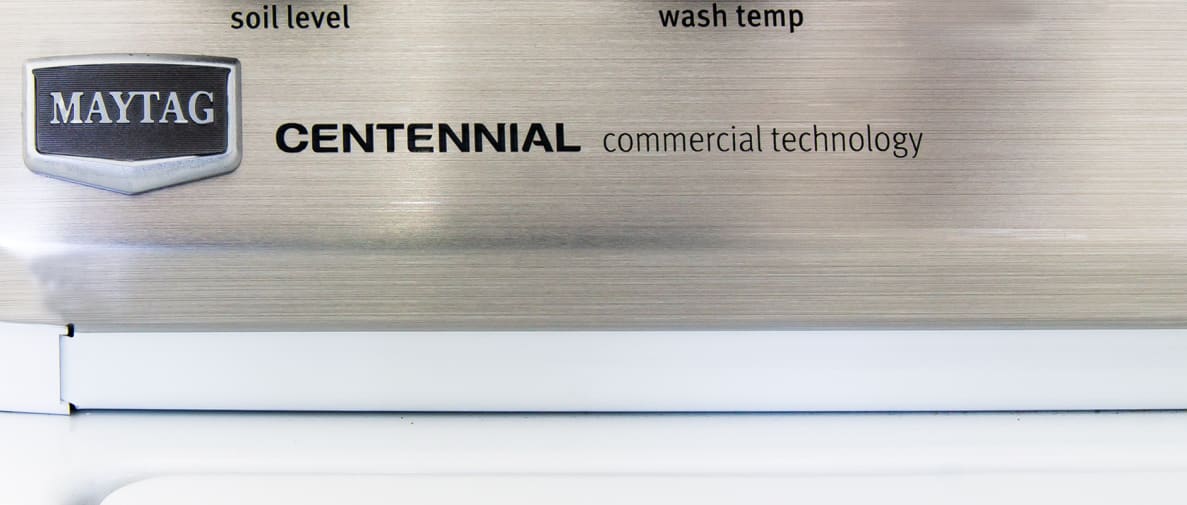We found the MVW425BW on sale for $450, and few washers cost less than that. And when it comes to stain removal, it does as well as machines that cost twice as much. It even outdoes a few of them when it comes to water and energy savings.
By the same token, few inexpensive washers clean this well and use so little water to do so. If you're looking for a basic washer that works well and won't cost you an arm and a leg to buy or run, it's hard to do better than this Maytag.
Design & Usability
Bare bones, but they're some strong bones.
The Maytag MVWC425BW couldn't be more straightforward. It lacks superfluous features, but still features a high efficiency design and an electronic control panel. Those controls are laid out from left-to-right, starting with "How dirty is it?" and finishing with, "Are you going to add fabric softener?" There is no Quick cycle.
{{ photo_gallery name="Maytag" }}
We've only got two major complaints, and both are very common to washers at this price point. First, there's no countdown timer or even end of cycle signal. There's a progress bar, but it doesn't let you know just how many minutes are left. Second is that it requires users to manually choose water level and temperature. We'd prefer a washer that makes those decisions for you—or at least one that makes suggestions. Still, most users have seen this format before. If you've used a top loader in the past fifty years, you'll be able to use this Centennial.
Performance & Features
Half the price, almost all the performance
When it comes to stain removal, the sub-$500 Maytag Centennial MVWC425BW comes within spitting distance of Maytag's pricier Bravos series of top loading washers.
Sure, the entire Bravos series does a marginally better job at lifting stains, and the Centennial is pretty rough on delicate fabrics. But the Centennial costs half the price of most Bravos machines, and its cycles don't use much hot water.
At the other end of the price spectrum, the Maytag might cost $50 more than some cheaper front loaders, but the Centennial's miserly water use will save you more than that every year in water and energy costs. Unless you need sanitizing cycles or more capacity, this Centennial will do the trick for most users.
For in-depth performance information, please visit the Science Page.
Conclusion
Some people just want simple, inexpensive appliances. If you're one of them, you can't do much better than the Maytag Centennial MVWC425BW, which can be found for under $450 on sale. It lacks extraneous features, but cleans nearly as well as machines that cost twice as much. We're also happy to find a washer that's both inexpensive to buy and cheap to run. The Centennial's low water and energy costs push it ahead of other budget top loaders.
By the Numbers
The scientific method is the bedrock of our review philosophy. For washers like the Maytag Centennial MVWC425BW, the most important factors to examine are cleaning performance, clothes wear, and energy efficiency. It didn't ace any of our tests, but it did well enough on the vast majority of them to make it one of our top scoring top loaders.
Cleaning Performance
Our cleaning performance testing relies on standardized strips of stained cloth, which are mechanically coated in common household stains like cocoa and red wine. After each cycle finishes, we scan each strip with a photospectrometer to see how much of each stain has been lifted.
The Maytag MVWC425BW did the best with the Power Wash cycle, cutting through cocoa and wine stains. In fact, across all cycles, it only lagged behind its higher-end top loading brethren when it came to removing blood stains.
Unfortunately, the Centennial achieved its cleaning objectives through brute force. The Delicates cycle, for instance, removed stains as well as the Normal cycle because it was just as rough on clothes.
While the Centennial lacked a Quick cycle, the Normal cycle took just 43 minutes to get the job done. In our evaluation, that helped it overcome its missing cycle.
Efficiency
Efficiency is two-pronged in our testing labs: It's a measure of what goes in and what comes out. Water and electricity are what go in. To measure that, we attached energy and water meters to the Maytag Centennial MVWC425BW. Based on national average costs for electricity and water, we calculate that this washer will cost you $42.26 a year to run.
That's on the low side amongst top-loaders, and it's mostly because the Centennial relies on cooler temperatures to get the job done. Heating water up requires energy, which costs money. While higher end machines can get as hot as 155ºF, the Centennial's cycles were never warmer than 100ºF.
The second half of our efficiency equation is water retention. That's the amount of water laundry retains at the end of the cycle. The more water that is retained, the more time and energy your dryer will have to expend. In this regard, this Maytag lagged behind. We consider anything hovering around the 50% mark to be acceptable. However, the Centennial's test loads retained around 72% of their weight in water.
Meet the tester
Jonathan Chan currently serves as the Lab Manager at Reviewed. If you clean with it, it's likely that Jon oversees its testing. Since joining the Reviewed in 2012, Jon has helped launch the company's efforts in reviewing laptops, vacuums, and outdoor gear. He thinks he's a pretty big deal. In the pursuit of data, he's plunged his hands into freezing cold water, consented to be literally dragged through the mud, and watched paint dry. Jon demands you have a nice day.
Checking our work.
Our team is here to help you buy the best stuff and love what you own. Our writers, editors, and experts obsess over the products we cover to make sure you're confident and satisfied. Have a different opinion about something we recommend? Email us and we'll compare notes.
Shoot us an email


